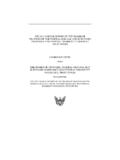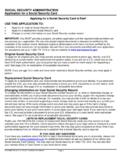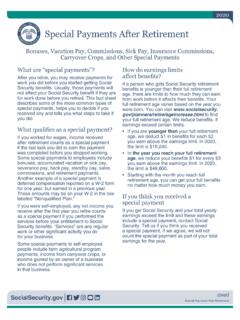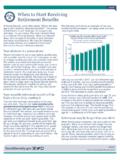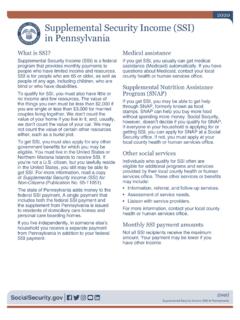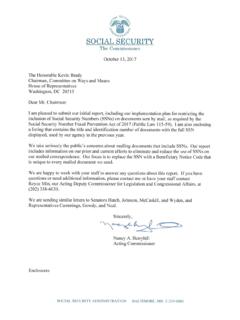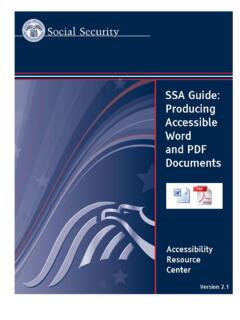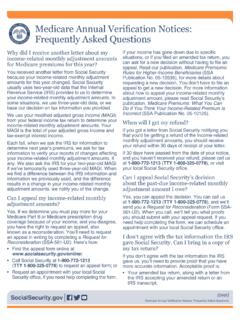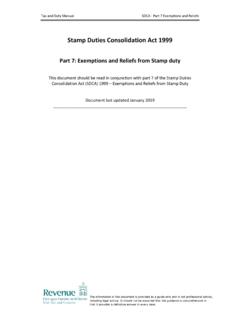Transcription of Agreement Between The United States And Japan
1 (over) Agreement Between The United States And JapanAgreement Between The United States And JapanContentsIntroduction 1 Coverage and Social Security taxes 2 Certificate of coverage 3 Monthly benefits 5A Japanese pension may affect your benefit 9 What you need to know about Medicare 9 Claims for benefits 9 Japanese social insurance agencies 11 Authority to collect information for a certificate of coverage (see pages 3-9) 11 Contacting Social Security 12 IntroductionAn Agreement effective October 1, 2005, Between the United States and Japan improves Social Security protection for people who work or have worked in both countries.
2 It helps many people who, without the Agreement , would not be eligible for monthly retirement, disability or survivors benefits under the Social Security system of one or both countries. It also helps people who would otherwise have to pay Social Security taxes to both countries on the same the United States , the Agreement covers Social Security taxes (including the Medicare portion) and Social Security retirement, disability and survivors benefits. It does not cover benefits under the Medicare program or the Supplemental Security Income Japan , the Agreement covers Social Security taxes (including the Japanese health insurance portion, in some cases) and Social Security retirement, disability and survivors benefits.
3 It does not cover the national pension Fund and the Employees pension Fund which are corporate pension funds under which participation and contributions are voluntary. The pension system for members of local assemblies, a supplemental pension system for local government workers, is also not covered by the Agreement . The Agreement also does (over) Agreement Between The United States And Japannot apply to the Old-Age Welfare pension or other Japanese non-contributory, meanstested allowances paid from general booklet covers highlights of the Agreement and explains how it may help you while you work and when you apply for Agreement may help you, your family and your employer While you work If your work is covered by both the and Japanese Social Security systems, you (and your employer, if you are employed) would normally have to pay Social Security taxes to both countries for the same work.
4 However, the Agreement eliminates this double coverage so you pay taxes to only one system (see pages 2-9). When you apply for benefits You may have some Social Security credits in both the United States and Japan but not have enough to be eligible for benefits in one country or the other. The Agreement makes it easier to qualify for benefits by letting you add together your Social Security credits in both countries. For more details, see the section on Monthly benefits beginning on page and Social Security taxesBefore the Agreement , employees, employers and self-employed people could, under certain circumstances, be required to pay Social Security taxes to both the United States and Japan for the same the Agreement , if you work as an employee in the United States , you normally will be covered by the United States , and you and your employer will pay Social Security taxes only to the United States .
5 If you work as an employee in Japan , you normally will be covered by Japan , and you and your employer pay Social Security taxes only to the other hand, if your employer sends you from one country to work for that employer or an affiliate in the other country for five years or less, you will continue to be covered by your home country and you will be exempt from coverage in the other country. For example, if a company sends an employee to work for that employer or an affiliate in Japan for no more than five years, the employer and the employee will continue to pay only Social Security taxes and will not have to pay in rules apply to self-employed persons who, without the Agreement , would have to pay Social Security taxes to both countries (see the table on pages 2-3).
6 Summary of Agreement rulesThe following table shows whether your work is covered under the or Japanese Social Security system . If you are covered under Social Security, you and your employer (if you are an employee) must pay Social Security taxes. If you are covered under the Japanese system , you and your employer (if you are an employee) must pay Japanese Social Security taxes. The next section (beginning on page 3) explains how to get a form from the country where you are covered that will prove you are exempt in the other work statusCoverage and taxesYou are working in Japan :For a employer who: Sent you to work in Japan for five years or Sent you to work in Japan for more than five yearsJapan Hired you in JapanJapanFor a employerJapanFor the government and you are a:3(over) Agreement Between The United States And JapanYour work statusCoverage and taxes (either Social Security or federal retirement program) Japanese nationalJapanYou are working in the :For a Japanese employer who.
7 Sent you to work in the for five years or lessJapan Sent you to work in the for more than five Hired you in the a non-Japanese the Japanese government and you are a: Japanese nationalJapan are self-employed and you: Work only in the Normally work in the but transfer your business activity to Japan for five years or Work only in JapanJapan Normally work in Japan but transfer your business activity to the for five years or lessJapanIf this table doesn t seem to describe your situation and you are: Working in the to the address on page 3 for further information. Working in JapanWrite to the appropriate Japanese address on page 11 for further : As the table indicates, a worker employed in Japan can be covered by Social Security only if he or she works for a employer.
8 A employer includes a corporation organized under the laws of the United States or any state, a partnership if at least two-thirds of the partners are residents, a person who is a resident of the or a trust if all the trustees are residents. The term also includes a foreign affiliate of a employer if the employer has entered into an Agreement with the Internal Revenue Service (IRS) under section 3121(l) of the Internal Revenue Code to pay Social Security taxes for citizens and residents employed by the of coverageA certificate of coverage issued by one country serves as proof of exemption from Social Security taxes on the same earnings in the other for employeesTo establish an exemption from compulsory coverage and taxes under the Japanese system , your employer must request a certificate of coverage (form USA/J 6) from the at this address.
9 Social Security AdministrationOffice of International Box 17741 Baltimore, Maryland 21235-7741 USA4(over) Agreement Between The United States And JapanIf preferred, the request may be sent by FAX to (410) 966-1861. Please note this fax number should only be used to request certificates of special form is required to request a certificate but the request must be in writing and provide the following information: Full name of worker; Date and place of birth; Citizenship; Country of worker s permanent residence; Social Security number; Date of hire; Country of hire; Name and address of the employer in the and Japan ; Date of transfer and anticipated date of return; and A statement, signed by your employer, certifying whether or not you, and all family members who live with you in Japan , are covered by an employer-sponsored or other private health insurance plan while in Japan (see Note on page 5).
10 In addition, your employer must indicate if you remain an employee of the company while working in Japan or if you become an employee of the company s affiliate in Japan . If you become an employee of an affiliate, your employer must indicate if the company has an Agreement with the Internal Revenue Service under section 3121(l) of the Internal Revenue Code to pay Social Security taxes for citizens and residents employed by the affiliate and, if yes, the effective date of the employer can also request a certificate of coverage for you over the Internet using a special online request form available at Only an employer can use the online form to request a certificate of coverage.
